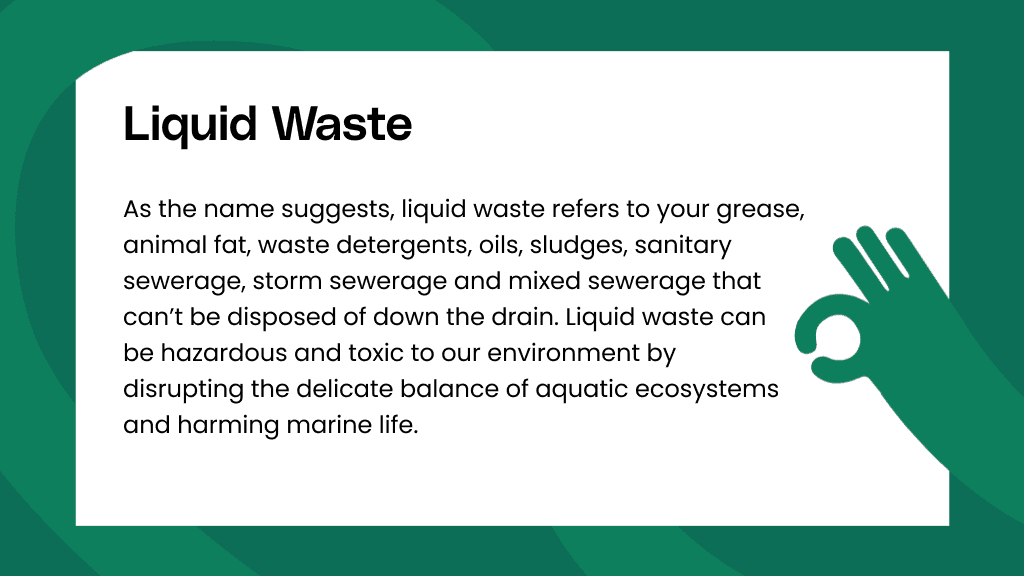Getting The Reclaim Waste To Work
Getting The Reclaim Waste To Work
Blog Article
7 Easy Facts About Reclaim Waste Explained
Table of ContentsThings about Reclaim WasteThe Best Strategy To Use For Reclaim WasteNot known Incorrect Statements About Reclaim Waste Reclaim Waste Fundamentals ExplainedGetting The Reclaim Waste To Work
Domestic sewer waste refers to the waste and items from a residential septic storage tank. The proper administration and disposal of residential sewage waste need fluid waste to be moved to a sewer therapy plant where the proper techniques and tools are used to detoxify and dispose of waste.
Business waste usually includes potential hazards, such as flammable products or a mix of fluid and solid waste products, and calls for an extra sophisticated and in-depth disposal procedure. The disposal of industrial waste typically involves the purification of waste prior to transport to make sure risk-free and correct disposal. Hazardous waste is developed from results and runoff of industrial processes and production.
This kind of waste can not use the very same sewage monitoring transport or processes as septic or commercial liquids. The hazardous waste administration procedure needs the assessment and screening of fluid waste prior to it undergoes the disposal process (liquid waste disposal). Runoff waste is the fluid waste that comes from overflow and excess stormwater in extremely inhabited areas or cities
Drainage waste can create contamination and flooding otherwise managed correctly. Discover more regarding sewer cleansing and waste administration. Guaranteeing proper waste administration can avoid calamities and decrease ecological injury. Both individuals in household settings and specialists in industrial or production markets can profit from recognizing the procedures and regulations of fluid waste management.
All About Reclaim Waste
Get in touch with PROS Providers today to find out about our waste monitoring and disposal services and the correct means to look after the fluid waste you produce.
(https://reclaimwaste1.carrd.co/)This supposed 'wastewater' is not only an essential resource however, after treatment, will certainly be released to our land, waterways or the sea. Made use of water from toilets, showers, baths, kitchen area sinks, washings and commercial processes is recognized as wastewater.

water used to cool machinery or clean plant and equipment). Stormwater, a kind of wastewater, is drainage that streams from agricultural and city locations such as roof coverings, parks, yards, roadways, courses and gutters right into stormwater drains pipes, after rainfall. Stormwater streams neglected straight to local creeks or rivers, eventually reaching the ocean.
The Best Strategy To Use For Reclaim Waste
In Queensland, a lot of wastewater is dealt with at sewer therapy plants. Wastewater is delivered from domestic or commercial sites with a system of sewers and pump stations, known as sewerage reticulation, to a sewage treatment plant.
The Division of Natural Resources recommends city governments concerning handling, operating and maintaining sewage systems and therapy plants. In unsewered areas, local governments might need householders to set up individual or household sewage therapy systems to deal with domestic wastewater from commodes, kitchen areas, restrooms and laundries. The Department of Natural Resources authorises using home systems when they are confirmed to be reliable.
In some brand-new class, treatment of some stormwater to eliminate trash, sand and crushed rock has actually begun utilizing gross pollutant traps. Wastewater treatment takes place in four phases: Eliminates strong issue.
Utilizes tiny living organisms knows as micro-organisms to break down and remove continuing to be liquified wastes and great fragments. Micro-organisms and wastes are included in the sludge.
The Of Reclaim Waste
Nutrient elimination is not readily available at all sewer therapy plants due to the fact that it needs costly specialized tools. Clear fluid effluent produced after treatment may still consist of disease-causing micro-organisms - industrial wastewater treatment.

This generally indicates wastewater needs to be dealt with or pollutants eliminated before it can be discharged to rivers. The majority of wastewater flows into the sewage system. Under the Act, city governments carry out authorizations and permits for ecologically pertinent activities (Ages) including wastewater releases that could have a neighborhood effect. The division administers approvals and permits to Ages including wastewater launches that could have a regional or statewide impact.
The Best Guide To Reclaim Waste
Or else, examples are taken for research laboratory evaluation. Usually several examinations are required to establish the levels of each of the different contaminants such as oils, heavy metals and chemicals in water. Tracking supplies valid details about water quality and can validate that licence conditions are being met. The details acquired through monitoring supplies the basis for making water top quality choices.
Report this page